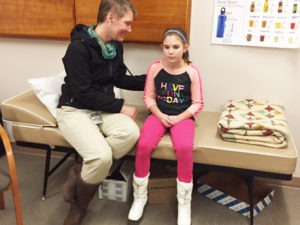
By Michael Howell
Last Friday, January 6, Tom Anderson, a Board Director at Marcus Daly Memorial Hospital, handed over a check for $6,500 to Stevensville School Superintendent Bob Moore and School Nurse Connie Johnson. Anderson said that the hospital considered it an honor to be able to contribute to the School Nurse program in Stevensville.
“It is an important program for the hospital and the board,” he said, “and we are very glad to be a part of this.”
Stevensville School Nurse Connie Johnson was on hand to accept the donation. Johnson has 20 years of experience as a Registered Nurse, ranging from acute care in a hospital, service in a nursing home, and work as a hospice nurse. She has served as the Stevensville School Nurse for the last six years.
Johnson thanked the hospital for the grant. She noted that the position of School Nurse was not a state-mandated position.
“Having a school nurse is not required, so it’s thanks to you that we have the program we do,” she said.
Superintendent Moore said that it is only through the commitment of the district school board and the generosity of the hospital that Stevensville has a full-time nurse on duty.
“A lot of small school districts in Montana don’t have a school nurse at all,” he said.
But calling it a full-time job might not convey the real proportions of the service. The recommended nurse to student ratio for students, according to Johnson, is one to 750. She is serving 1,000 students.
But that ratio is considering a population of ‘well’ students who may occasionally come down with a cold or the flu. Some students, however, have more constant and more demanding medical issues. According to Johnson, the number of students requiring special attention is growing dramatically, not just at Stevensville school, but across the nation.

“What’s going on here reflects the national trend,” said Johnson. Right now, she said, there are eight students in the district who are diabetic, two of them in elementary school. Each student has a treatment plan developed in consultation with the parents and their doctor. It is common for her to check the student’s blood sugar levels three times a day. She also administers injections. She said her policy is to teach the students to be able to treat themselves independently. There are a few high school students who treat themselves, although she monitors dosages and observes. She also texts all the parents involved so that they are aware of their child’s condition and treatment at all times. She said that in small schools with no nurse, that responsibility falls on the superintendent.
According to Superintendent Moore, in schools with no nurse, it actually ends up being done a lot of times by the secretaries and teachers. “But this is not what we should be doing,” he said.
And diabetes is just one kind of special medical need that shows up at school. There are the students suffering from asthma, from anaphylaxis (allergic reactions), and from seizures. Right now, one Stevensville student has leukemia. All of these students have special requirements and needs.
“We could not deal with this growing number of students with special needs without a nurse,” said Moore.
Having even just one student with an impaired immune response system, for instance, requires teachers and students to be more aware of basic hygienics.
“Disease surveillance becomes a big part of the job,” said Johnson. She works with mothers, custodians, teachers and students to try and protect especially sensitive students from the common things that run through the school, such as pink eye, strep and whatever kind of respiratory illness is going around.
According to Moore, having a school nurse is not only a necessity, it is a great benefit to the whole school and to the community.
“It highly affects learning,” he said. “When students lack proper care, they get sick, they fall behind in class work, they stay home. This creates a burden on the family. One of the parents may have to take off work.”
Having a school nurse, according to Moore, is “a necessity if we are going to meet this growing demand.”
What Johnson would stress, and does stress in her daily work, is not just the special treatment that is required by some, but what is required for the rest to keep active and healthy as well. Her overall aim is to promote general health.
“Our goal,” as she put it, “is to keep kids healthy so they can learn.”
